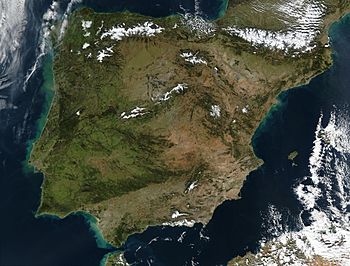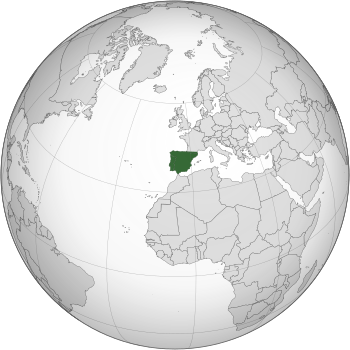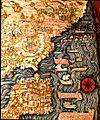Iberian Peninsula facts for kids

Satellite image of the Iberian Peninsula.
|
|
 |
|
| Geography | |
|---|---|
| Location | Southwest Europe |
| Coordinates | 40°N 4°W / 40°N 4°W |
| Area | 582,000 km2 (225,000 sq mi) |
| Highest elevation | 3,478 m (11,411 ft) |
| Administration | |
| Demographics | |
| Demonym | Iberian |
| Population | Over 57 million |
The Iberian Peninsula, also called Iberia, is a large piece of land in the southwest of Europe. Like other peninsulas, it has water on most of its sides. The Mediterranean Sea is to its south and east. The Atlantic Ocean is to its north and west.
It is the third largest peninsula in Europe. Its total area is about 582,860 square kilometers. The name "Iberia" comes from the Ancient Greeks. The Romans later called this area "Hispania". Today, "Hispania" is used for Spain, while "Iberia" refers to the whole peninsula.
Interestingly, the Ancient Greeks and Romans also used the name "Iberia" for another place. This other place, Caucasian Iberia, was far away near the Black Sea.
Countries and Territories
The Iberian Peninsula is home to several countries and territories:
- Spain: This country covers most of the peninsula. It includes the central, eastern, and northwestern parts.
- Portugal: This country takes up most of the western part of the peninsula.
- Andorra: This is a very small nation located in the Pyrenees mountains. It sits on the northern edge of the peninsula, between Spain and France.
- Gibraltar: This is a tiny British territory in the south. It shares a border with Spain.
Images for kids
See also
 In Spanish: Península ibérica para niños
In Spanish: Península ibérica para niños
 | Jackie Robinson |
 | Jack Johnson |
 | Althea Gibson |
 | Arthur Ashe |
 | Muhammad Ali |














